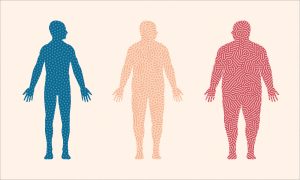
WEDNESDAY, Oct. 19, 2016 (HealthDay News) -- While it's well known that healthy living can lower the odds for colon cancer, a new study finds it's even true for men whose DNA puts them at high risk for the disease.
Components of a healthy lifestyle include exercise, proper nutrition, no smoking and reduced alcohol consumption, the study authors said.
An expert in colon health who reviewed the findings believes there's a lesson here for anyone bent on lowering their cancer risk.
"I think these lifestyle factors are things that everyone should strive to achieve if they can -- everyone can benefit," said Dr. Andrew Chan, associate professor of medicine at Harvard Medical School in Boston.
The new British study was co-authored by two London-based researchers, Matthew Frampton of The Royal Marsden NHS Foundation Trust and Dr. Richard Houlston of The Institute of Cancer Research.
The researchers noted that certain people are known to face a higher risk of colon cancer because of their genes. So far, the researchers said, there are 37 genetic mutations known to be tied to higher odds for the disease.
And overall, people in the top 10 percent in terms of their genetic risk for colon cancer are thought to have almost twice the chance of getting the disease, compared to the general population, the study authors said.
So, can a healthy diet, lots of exercise and other lifestyle factors help lower this group's colon cancer risk, too?
To find out, Frampton and Houlston pored through data on colon cancer incidence and deaths collected between 2001 and 2012 by the U.K.'s Office for National Statistics.
Focus was placed on more than 1.4 million British men in their late 50s who during the study timeframe were just a few years shy of Great Britain's age threshold for free screening.
Mathematical models revealed that nearly a quarter of men between 55 and 59 had genes that raised their odds of getting colon cancer to a rate that was similar to men already aged 60 or above.
The same analysis found that these men bore a 29 percent risk of developing colon cancer over the next 25 years.
In the end, nearly 1,300 of these 50-something men with the "bad" genes developed colon cancer, the study found.
But healthy living reduced the odds for colon cancer risk -- even among these genetically disadvantaged men, the findings showed.
Overall, adopting a healthy lifestyle cut their 25-year risk for the disease from nearly 30 percent to as low as 13 percent, the research team reported.
Healthy lifestyle factors included consuming less alcohol and red meat, consuming more fruits and vegetables, keeping weight under control, staying active and avoiding smoking.
How many lives might be saved?
The British researchers estimated that if 10,000 men with the highest inherited risk for colon cancer adopted the healthiest possible lifestyle, more than 600 could be spared colon cancer over the next 25 years.
In a news release outlining the study's conclusions, Houlston said that efforts to test and identify patients at the highest risk for colon cancer could be key to preventing the disease. "We can begin to give them targeted health messages, aimed at helping them make choices that could prevent the disease," he explained in a news release from study funder Cancer Research UK.
Still, not everyone is convinced by the findings.
Dr. David Carr-Locke is chief of the division of digestive diseases and associate chair of medicine at Mount Sinai Beth Israel Medical Center in New York City. He read over the study and said he was "not very convinced by the material," and questioned the reliability of the mathematical model the team used for their investigation.
"I would not say that this proves that lifestyle changes reduce the risk" of colon cancer for men whose DNA predisposes them to the illness, he said.
Chan disagreed, however, and said the study provided a "proof of principle" that healthy lifestyles do matter, even for high-risk patients.
The study "confirms some other previous studies, which have shown that adjusting one's lifestyle can really have substantial impact on whether one will develop colon cancer," said Chan, who is also associate professor of medicine and gastroenterology at Massachusetts General Hospital in Boston.
Chan believes a healthy lifestyle may be protective for everyone, regardless of their DNA.
"These types of interventions will work to some degree across the board," he said.
According to the American Cancer Society, when skin cancers are excluded, colorectal cancer is the third most common cancer in the United States, with almost 135,000 new cases reported each year. Over 49,000 Americans died from the disease in 2016.
The study findings were published in a recent issue of the journal Genetics in Medicine.
More information
Find out more about colon and rectal cancers at the American Gastroenterological Association.
Copyright © 2016 HealthDay. All rights reserved.
Click here to view original web page at www.upi.com
lifetime risk of colon cancer












